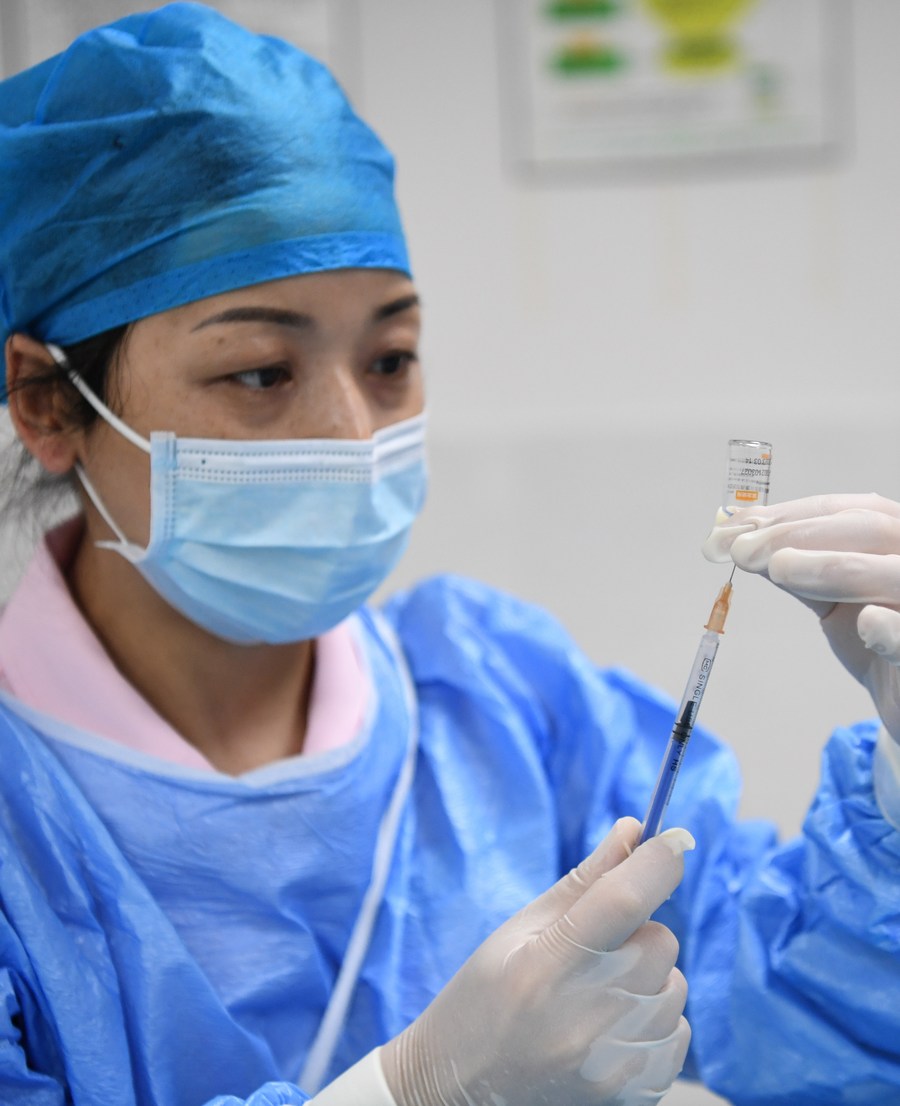China to improve medical insurance system to better meet people's healthcare needs

A medical worker prepares a dose of COVID-19 vaccine at a hospital in Yuexiu District of Guangzhou, south China's Guangdong Province, April 15, 2021.(Xinhua/Deng Hua)
BEIJING, Sept. 15 (Xinhua) -- The State Council's executive meeting chaired by Premier Li Keqiang on Wednesday adopted the 14th Five-Year Plan for National Medical Security and made arrangements on improving the medical insurance system to better meet people's needs for medical services and drugs.
Since the new round of medical reform, China has put in place the world's largest basic medical insurance network covering the entire population. During the 13th Five-Year Plan period (2016-2020), basic medical insurance schemes covered 1.36 billion people, with the coverage rate staying above 95 percent.
"Providing public medical products to the entire population is a basic institution that protects people's health. After years of efforts, China has established a basic medical insurance system with universal coverage. This has played an important role in making medical services more accessible and affordable, improving people's well-being and maintaining social harmony and stability," Li said.
The meeting required improving the multi-tiered medical insurance system. Support policies for medical insurance will be refined in a category-based manner. The plan for universal coverage of medical insurance will be implemented. Urban employees and rural and non-working urban residents are encouraged to enroll at places where they live or work. The household registration restrictions will be lifted for the flexibly employed to participate.
The benefits under the basic medical insurance schemes for outpatient treatment reimbursement will be steadily increased. Outpatient drugs for high blood pressure and diabetes will be better guaranteed for rural and non-working urban residents. The serious illness insurance scheme will be better aligned with the basic medical insurance schemes to improve insurance benefits. Major disease relief mechanisms for disadvantaged groups will be improved.
Related mechanisms will be improved whereby treatment is provided before the medical bills are paid in case of major epidemics, and special groups are exempted from their medical expenses and the costs of certain diseases' treatment waived. Development of commercial health insurance will be supported, and insurance products targeting senior citizens and other groups diversified. Long-term nursing care insurance schemes will be steadily developed. Policy measures for maternity insurance will be improved.
"Since advancing the new round of medical reform, our goal for the development of the basic medical insurance schemes was to achieve full coverage, meet basic needs and ensure sustainability, and on that basis, make steady improvements," Li said. "During the 14th Five-Year Plan period (2021-2025), we will deepen the reform of the medical insurance system. We will do our level best wherever the conditions permit. We will stay committed to meeting people's basic medical needs while enhancing medical services and promoting sustainability."
Policies of medical insurance payment will be improved, development of tiered diagnosis and treatment system and medical consortiums advanced, and eligible medical institutions at the primary level listed as designated medical insurance institutions, to improve services of medical institutions at the primary level, avoid excessive medical treatment, and ensure more effective use of medical insurance funds.
The reforms of medical insurance and drugs will be advanced in a coordinated way. Centralized drug bulk-buying will be implemented on an ongoing basis, and the scope of such procurement of high-value medical consumables extended, to curb exorbitant prices on drugs and medical consumables. Drugs with high clinical value and notable benefits for patients will be made reimbursable under the basic medical insurance schemes in a timely manner. The list of drugs covered by the schemes will be essentially unified nationwide next year.
Services of medical insurance handling will be improved. A medical insurance service network covering provinces, cities, counties, townships and villages will be put in place. Inter-provincial access to government services will be facilitated including the registration, renewal and transfer of basic medical insurance schemes. Online settlement of hospitalization and outpatient expenses incurred at non-local hospitals will be made available nationwide.
The oversight of medical insurance funds will be intensified. Responsibilities will be rigorously enforced, and inter-agency coordination enhanced. Systematic monitoring, on-site inspections and other oversight methods will be employed in a holistic way to realize full coverage. Third parties such as commercial insurance providers will be involved to make oversight more professional. The role of public scrutiny will be better brought out. The use of the medical insurance funds and the problems identified will be made public without delay, to resolutely crack down on health insurance fraud.
"We should establish a mechanism where the basic medical services system adapts to the basic medical insurance schemes and vice versa. Greater efforts are needed to advance the tiered diagnosis and treatment system, and develop medical consortiums and regional healthcare centers, to facilitate medical institutions at the primary level to improve medical services," Li said.
Photos
Related Stories
Copyright © 2021 People's Daily Online. All Rights Reserved.










